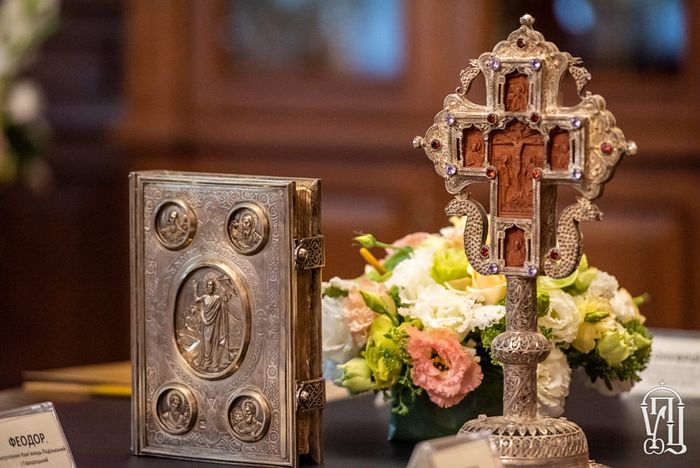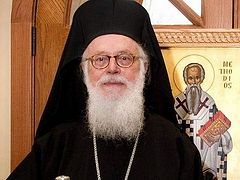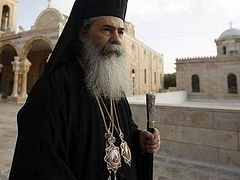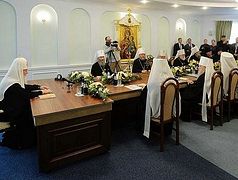Kiev, December 6, 2019
The Holy Synod of the canonical Ukrainian Orthodox Church gathered in its last session of the year at the Holy Dormition-Kiev Caves Lavra under the chairmanship of His Beatitude Metropolitan Onuphry of Kiev and All Ukraine today.
Having discussed the latest developments in inter-Orthodox relations, the Synod issued a statement published on the site of the Ukrainian Church’s Department for External Church Relations.
In the statement, the hierarchs note that the current crisis occasioned by the Patriarchate of Constantinople’s anti-canonical invasion of Ukrainian Church territory reaches far beyond just relations between the Patriarchates of Moscow and Constantinople, but rather concerns all Local Churches.
The Synod also defends the decision to break communion with those who recognize the schismatics, arguing that this is not “abuse of the Eucharist,” as has been charged by certain hierarchs of other Local Churches.
Thanks to the actions of the Churches of Constantinople, Alexandria, and Greece, “the situation in the Orthodox world has deteriorated significantly and the separation between the Local Orthodox Churches has deepened not only administratively, but also on a spiritual level—that is the level of communication in the Sacraments,” the Ukrainian Synod laments.
The current crisis concerns the entire Orthodox world, the hierarchs write, “since it destroys the very foundations of the life and mission of the Church of Christ.”
Moreover, this problem is not administrative, as some have stated, “but ecclesiological.” The recent theory of the Patriarch of Constantinople as the “First Without Equals” is a “violation of the principle of unity of the Church and the consequence of a wrong understanding of the nature of the Church in general and the role of individual Local Churches in the Body of Christ’s Church in particular.”
Moreover, as the hierarchs note, the Patriarchate of Constantinople now allows people without the grace of ordination to concelebrate—“which is a blasphemy and a desecration of the Eucharist.”
And referring to accusations about the Eucharist, the Synod writes:
Given this, the Ukrainian Orthodox Church’s termination of Eucharistic communion with the Patriarchate of Constantinople and with the Churches and hierarchs that recognized the schismatics is not an abuse of the Eucharist, or even more so blackmail of the Eucharist, as some sometimes say, but on the contrary, is the protection of the Eucharist and the preservation of the canonical and spiritual purity and integrity of the Church. For our Lord Jesus Christ, in the words of the holy Apostle Paul, loved the Church, and gave Himself for it… That He might present it to Himself a glorious Church, not having spot, or wrinkle, or any such thing; but that it should be holy and without blemish (Eph. 5: 25-27).
Thus, accusations that the Ukrainian Church is moving towards self-isolation are false and manipulative, the Synod states.
They continue forcefully:
In fact, we defend the purity of the canonical tradition of the Church and protect the Church from blasphemy. Otherwise, if persons who do not have canonical ordinations are admitted to the priesthood, if the schism is declared by the Church, and the real Church of Christ is ignored or called a schism, then there is a danger of the substitution of the Church. In addition, such anti-Church actions blur the line between the Church and schism. As a result, a new “Church” is created, founded by people, instead of the one that our Lord Jesus Christ founded, having acquired it for Himself by His own Blood (cf. Acts. 20:28).
It is a basic principle of Orthodox canonical law that whoever enters into communion with the excommunicated thereby excommunicates himself, the Synod recalls. Thus, there is a serious question today of whether those who remain in communion with the schismatics are thereby complicit in the same sin and in violation of the aforementioned canonical principle.
The Ukrainian hierarchs believe the only way out of the current crisis is a pan-Orthodox council, and thus they fully support the initiative of His Beatitude Patriarch Theophilos of Jerusalem, who recently invited the primates to gather in Jordan.
“In the difficult times in the history of our Church, there was already a case of the help of the Patriarchate of Jerusalem, when in 1620 Patriarch Theophanes of Jerusalem in Kiev renewed the Orthodox hierarchy to replace those who had gone to the Uniates under the pressure of the then Polish-Lithuanian authorities,” the Synod reminds.
The Synod also laments that certain Local Churches make their ecclesiastical decisions under the influence of geopolitical and political factors. “However, we are deeply convinced that every Local Church in its service to God should be higher than national, state or political boundaries and interests and not give in to external pressure, remembering that the Kingdom of God, which we preach, is not of this world (see Jn. 18: 36),” the statement reads. Otherwise, Orthodox unity will be impossible, as states are often in conflict with one another.
“But the Church must maintain unity and reconcile people, and not become a party or a means of confrontation,” the Synod writes.
In conclusion, the Synod calls on all the hierarchs, clergy, monastics, and laity of the Ukrainian Church to remain faithful and strong, certain that “there is no self-isolation with Christ,” as His Beatitude Metropolitan Vladimir (Sabodan) of blessed memory said.
“Fear not! You are in the true Church! Love the Church; take care of the Church and yourself in it, because the Lord save us through it. And leave the rest to the will of God. Remember that it is not the people who rule the Church, but the Lord Himself. Let us pray that the Lord by His Holy Spirit will correct all human errors, cleanse us from all unrighteousness, and save our souls!” the hierarchs conclude.




